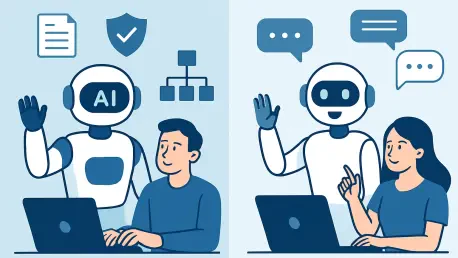The evolution in AI conversational technologies has not just changed the landscape of automation; it has redefined the way businesses approach user interaction, task completion, and process optimization. At the forefront are AI chatbots and AI agents, each carving unique niches and transforming the way various sectors operate. The dynamism of these tools lies not only in their capabilities but also in the strategic implications tied to their deployment. By examining their features, performance, and impact, businesses are poised to make informed decisions, ensuring they harness these technologies’ full potential.
Emerging Influence of AI Conversational Technologies
AI chatbots and AI agents embody the dual essence of communication and automation, backed by sophisticated technologies that emerged from years of research and innovation. These tools are not merely conversation facilitators; they are integral parts of modern digital ecosystems that drive efficiency and enhance user experiences. Their arrival in the technology and business domains highlights their pivotal role in streamlining operations, boosting engagement, and pushing the boundaries of what’s possible in AI integration.
Enter AI chatbots, whose core design revolves around robust natural language processing (NLP) capabilities, enabling seamless human-like interaction tailored to user needs. The counterpart, AI agents, extends this interaction toward executing tasks autonomously, delving into decision-making and complex problem-solving. This division in function caters to distinct business needs, proving instrumental in adapting to a rapidly evolving technological environment.
Distinctive Features and Components
NLP Proficiency in Chatbots
Natural language processing serves as the foundation of chatbots, allowing them to interpret, understand, and respond to human language with precision. This ability is vital for ensuring effective communication between users and systems, capable of managing queries, facilitating data collection, and offering predefined guidance. Chatbots leverage NLP to maintain a conversational flow, demonstrating proficiency in language handling that continues to impress.
The performance of the NLP in chatbots heavily relies on machine learning algorithms and extensive datasets, which aid in refining interactions and enhancing user satisfaction. As chatbots are tasked with more responsibilities, NLP emerges as a critical determinant of their success in various applications.
Autonomous Actions by AI Agents
AI agents exemplify a step beyond mere responses; they embody autonomous capability in assessing contexts and making decisions without requiring constant user intervention. This feature sets them apart, ideal for executing complex sequences such as transaction processing, intricate scheduling, and coordinating logistical tasks. AI agents integrate NLP with more nuanced execution frameworks, showcasing higher levels of automation.
Their technical prowess is evident in applications demanding sophisticated infrastructure, often necessitating costly integration but delivering high precision and efficiency in return. This characteristic reinforces AI agents’ role in leading transformative automation across sectors, enhancing productivity through decisive autonomous activity.
Unveiling Recent Trends
The progression of AI conversational technologies continues to be driven by rapid advancements that redefine their capabilities and market presence. Innovations in NLP algorithms, expanded deployment across industries, and increasing business reliance mark significant shifts seen over recent periods. These trends include elevated consumer expectations of AI interactions, further intertwining in routine business processes.
Emerging behaviors in AI adoption indicate a strategic movement toward deeper integration, focusing on complex task handling and scalable solutions. By discerning these movements, industry players are adapting models accommodating cutting-edge developments, leveraging new data insights to keep at the forefront of technological excellence.
Diverse Applications Across Sectors
AI chatbots and agents demonstrate remarkable adaptability, translating theoretical applications into tangible benefits across various industries. In customer service, healthcare, finance, and e-commerce, they deliver enhanced functionality, improving service delivery and operational efficiency.
Notable implementations include automated patient care assistants in health facilities, dynamic customer service protocols in banking, and intuitive shopping experiences in retail sectors. These cases highlight the unique capabilities of AI conversational tools, validating their role in transforming business operations by meeting specific demands effectively.
Addressing Challenges and Limitations
Despite their promising advantages, AI chatbots and agents face challenges inhibiting their full potential. Technical barriers like complexity in system integration, algorithm accuracy issues, and user acceptance pose critical questions for developers and businesses alike. Additionally, regulatory scrutiny over AI operations raises concerns regarding ethical deployment and data privacy.
Overcoming these challenges requires dedicated development efforts and strategic planning, focusing on improving interoperability, refining algorithms, and fostering transparency. The ability to navigate these hurdles will determine the sustainability and growth of AI conversational technologies within competitive markets.
Anticipating Future Developments
The future of AI technologies will likely witness significant breakthroughs shaped by continual research and expanding applications. Anticipated developments include refined NLP models, advanced functionality, and extensive cross-industry deployment, leading toward more autonomous systems.
Long-term prospects promise profound impacts on societal operations, altering how businesses and consumers interact with technology on multiple fronts. As opportunities unfold, industries are poised to benefit by embracing emerging AI tools, setting the stage for innovations that redefine interaction paradigms and business strategies.
Conclusive Assessment
In retrospect, the rise of AI chatbots and agents has cemented their place as critical components in modern automation frameworks. Today, they offer unparalleled advantages but are not devoid of challenges and limitations. Businesses pursuing innovation must continue to leverage these technologies while addressing pending issues. Their future potential depends on adaptive deployment capable of meeting diverse industry needs. Ultimately, these AI tools are reshaping business landscapes, providing a competitive edge and revealing new avenues for expanded operations.









